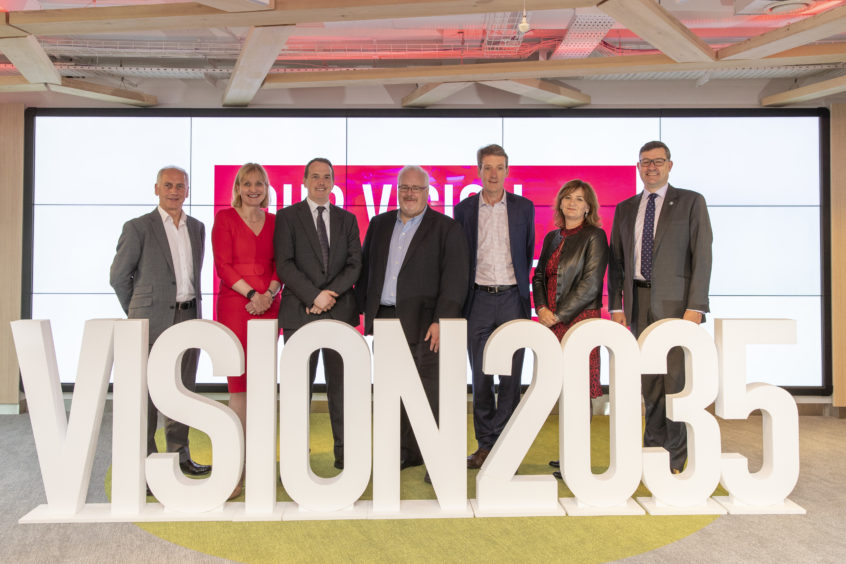
UK oil chiefs believe their “vision” for the future can play a crucial role in tackling one of the biggest challenges ever faced – the energy transition.
A task force made up of big hitters has now been assembled to devise a roadmap showing what needs to be done and by when to deliver Vision 2035.
Industry wants to fulfil as much UK oil and gas demand as possible through domestic production and help boost supply chain revenues at home, abroad and from other sectors, while supporting the low carbon push.
If its “vision” comes good, an additional £290 billion worth of revenue will be generated between now and 2035, giving a total of £920bn.
Vision 2035 has been talked about for a number of years in senior management circles, but large parts of the workforce are still unsure what it means.
A new campaign – Our Vision. Our Future – was launched today to make sure everyone working in the industry understands the objectives, and to encourage people to come forward and say how those can be achieved.
At the campaign’s preview event in Aberdeen, North Sea chiefs stressed the sector should be a driving force behind the shift to cleaner energy systems, and cannot allow itself to be seen as “the bad guy any more”.
But industry must still go after more North Sea oil and gas to “keep people warm” at affordable prices, and expand the supply chain’s footprint, they argued.
The new task force will be charged with devising measurable targets relating to skills, technology, exports, diversification and culture.
The group will be chaired by Deirdre Michie, chief executive of Oil and Gas UK (OGUK).
Other members include Steve Phimister, Shell; Andy Samuel and Stuart Payne, the Oil and Gas Authority; Collette Cohen, the Oil and Gas Technology Centre (OGT); Andy McDonald, Scottish Enterprise; Matt Abraham, OGUK; John McDonald, Opito; and Trevor Garlick, Opportunity North East.
Its formation comes at a time of heightened pressure on oil companies from climate change activists and investors to cut their spending on fossil fuel production and switch to renewables.
Those behind Vision 2035 point out that global energy demand will grow 30% in the next 15 years, and that oil and gas will be a necessary source of energy during that period.
The oil and gas industry also supports 280,000 jobs and puts large sums of money into the public purse through tax revenues.
At the same time, there is a growing acceptance that the industry needs to reduce its impact on the environment.
Oil majors are increasingly investing in renewables.
And work is under way in the UK to develop technologies for carbon capture and storage and the integration of offshore gas and wind infrastructure, with support from oil companies.
Ms Michie said Vision 2035 was set “in the context” of the energy transition — not in isolation to it – and that the oil and gas industry can play a constructive and leading role.
At a campaign preview event in Aberdeen, she said: “Now is the time to come together to think about what our future should look like.
“We need to be part of one of biggest changes ever undertaken by our sector and contribute to the energy transition on an international level.”
Mr Phimister said the world needed “more energy and cleaner energy”.
He also said the energy transition was an “enormous issue” and that the oil and gas industry could not simply “muddle its way through”.
Mr Phimister called on the sector to keep innovating and being “courageous” with technology development.
Rebecca Allison, asset integrity solution centre manager at the OGTC, said: “I have a 12-year-old son who came home from school and said, ‘mum, I do not want to use fossil fuels any more.’
“We cannot allow ourselves to be seen as the bad guys any more. Oil and gas is seen as a problem. We should be the driving solution to the energy transition. Fossil fuels are here to stay, but in a different way.”
Victoria Cameron, business coordination manager at Kellas Midstream, agreed the oil and gas industry wouldn’t be “sidelined”, but would play a central role in the transition.
She added: “Parents are discouraging children from joining the industry. We have a responsibility to make people believe in this industry again.
“We need to believe in security of supply. The UK is a net importer of fuel and during the Beast from the East, the country was hours away from blackout. We have a responsibility to keep people warm.”
Hedda Felin, senior vice president, Equinor UK and Ireland, said: “There are a lot of exciting opportunities ahead. As an industry we have a huge responsibility to supply energy in a safe, affordable and sustainable way.
“Vision 2035 enables us to respond to these demands and also capture the future potential of the UK Continental Shelf.”
Companies and employers are being urged to join the conversation by sharing their ideas about how Vision 2035 will be achieved on the dedicated microsite www.energyvision2035.com and on social media using the hashtag #ourvisionourfuture or #jointheconversation and nominating individuals to become “Visionaries” – ambassadors for the campaign.
Recommended for you

